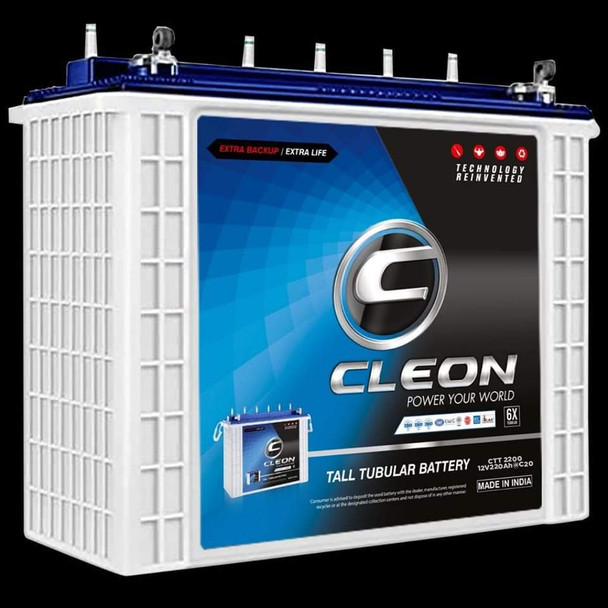Understanding Tubular Batteries: Benefits, Applications, and Maintenance
Introduction
Tubular batteries have gained a solid reputation in the power backup and energy storage industry, thanks to their durability, efficiency, and long-lasting performance. Whether you're using them for solar energy systems, inverters, or industrial applications, tubular batteries are widely regarded as one of the best solutions for consistent power supply. In this guide, we'll explore the benefits, applications, and maintenance tips that every user should know to get the most out of their tubular batteries.
Cleon Solar and Inverter Tall Tubular battery 12V 240AH
Benefits of Tubular Batteries
Tubular batteries come with several key advantages that set them apart from other battery types. Let’s look at some of the top benefits:
1. Longer Lifespan
One of the most notable features of tubular batteries is their longer lifespan. Due to their robust design and construction, tubular batteries can last between 5-15 years with proper maintenance. This makes them an economical choice for both household and industrial uses, especially in areas where power interruptions are frequent.
2. Higher Efficiency
Tubular batteries offer a higher efficiency rate when compared to flat plate or other battery types. This means they can store more energy and discharge it over a longer period. They are designed to handle deep discharge cycles, which makes them ideal for applications that require sustained power over time.
3. Minimal Maintenance
Although all batteries require some form of maintenance, tubular batteries generally require less frequent attention. Their unique design reduces the risk of water loss, meaning you’ll spend less time refilling or checking water levels. This adds to their overall ease of use, especially in situations where consistent monitoring isn’t possible.
4. Resistant to Harsh Conditions
Tubular batteries are built to withstand high temperatures and demanding conditions, making them suitable for outdoor use or locations with extreme weather. Their resistance to corrosion further enhances their longevity, especially in regions with high humidity or near the coast.
5. Deep Discharge Recovery
Tubular batteries are well known for their ability to recover from deep discharge, which is when the battery is almost fully drained. Unlike other battery types that may degrade quickly if deeply discharged, tubular batteries can handle deep discharge cycles better, making them reliable for frequent and long power outages.
Kan 12v. 220AH Solar Tubular Battery
Applications of Tubular Batteries
Tubular batteries are versatile and have various applications across multiple industries. Here are some common uses:
1. Solar Power Systems
One of the most popular uses of tubular batteries is in solar power storage. They are highly efficient at storing solar energy during the day and supplying power at night or during outages, making them an essential component for off-grid solar systems.
2. Inverters
Tubular batteries are widely used for inverter power backup systems in homes, businesses, and industries. They can handle frequent power cuts and provide uninterrupted power for long durations, ensuring that essential appliances and devices continue to function smoothly.
3. Telecommunication Towers
Given their reliability and ability to function in extreme weather, tubular batteries are commonly employed in telecommunication towers, where continuous power is vital to maintain connectivity and operations.
4. Uninterruptible Power Supply (UPS) Systems
UPS systems rely heavily on tubular batteries for smooth operation during power interruptions. They provide the necessary backup for critical infrastructure such as data centers, hospitals, and industrial plants.
5. Electric Vehicles and Industrial Applications
In recent years, tubular batteries have started being used in electric vehicles and other industrial machinery that requires a steady power source. Their capacity for deep discharge and rapid recovery makes them a viable option for these applications.
Cleon Solar and Inverter Tall Tubular Battery 12V 200AH
Maintenance Tips for Tubular Batteries
To ensure your tubular battery performs optimally and lasts for its expected lifespan, regular maintenance is essential. Here are some simple yet effective maintenance tips:
1. Check Water Levels Regularly
Even though tubular batteries require less frequent water refills than other types, it’s still important to check the water levels at least once every 3-6 months. Use only distilled water for refills, as other liquids may damage the battery.
2. Keep the Battery Terminals Clean
Corrosion on battery terminals can impact the performance of your tubular battery. Regularly clean the terminals with a mixture of baking soda and water to prevent corrosion and ensure a smooth flow of electricity.
3. Ensure Proper Ventilation
Tubular batteries emit gases when charging. Make sure the area where the battery is stored is well-ventilated to avoid any buildup of harmful gases.
4. Avoid Overcharging
Overcharging can significantly reduce the lifespan of your tubular battery. Most modern inverter systems come with built-in overcharge protection, but it’s always good to keep an eye on your charging settings.
5. Keep the Battery in a Cool, Dry Place
Heat is one of the biggest enemies of batteries. Ensure your tubular battery is stored in a cool, dry place away from direct sunlight or extreme heat sources to prevent degradation.
Energos Tubular Battery 220ah 12v
Advanced Maintenance Tips and Troubleshooting
In addition to regular maintenance, it's crucial to understand some advanced care techniques and troubleshooting methods that can help extend the life of your tubular battery and ensure efficient operation.
1. Equalizing Charge
An equalizing charge is a controlled overcharge performed to ensure all cells in the battery have the same voltage. This is essential for preventing issues like sulfation and stratification. Most inverters have an equalizing charge option that can be manually activated. Ideally, an equalizing charge should be done every 6 months or as recommended by the manufacturer.
2. Avoiding Deep Discharge
While tubular batteries are designed to handle deep discharge cycles, it's recommended not to let the battery discharge completely. Frequent deep discharges can reduce the lifespan of the battery. You can set your inverter to alert you before the battery reaches dangerously low levels, allowing you to prevent over-discharge.
3. Battery Health Monitoring
Many modern inverter systems come equipped with battery health monitoring features. These systems provide real-time updates on battery performance, charge cycles, and potential issues. By monitoring this data, you can proactively address any issues before they lead to significant performance degradation.
4. Regular Terminal Inspection
In addition to keeping the terminals clean, it's important to inspect them regularly for any signs of wear or damage. If the terminals are loose, corroded, or appear damaged, it may lead to poor battery performance. Tighten loose connections and replace damaged terminals as necessary.
5. Monitor for Leakage
While tubular batteries are sealed and designed to prevent leakage, it's still possible for acid or water leakage to occur if the battery is overfilled or damaged. Check for any signs of leakage around the battery and immediately address the issue by contacting a professional service.
Epochem Distilled Water 20 Liters
Troubleshooting Common Tubular Battery Issues
1. Battery Not Charging Fully
If your tubular battery isn’t charging fully, this could be due to a variety of reasons. First, check the connections to ensure that they are tight and free of corrosion. Next, inspect the charger or inverter to confirm that it is functioning properly. If these steps don’t solve the issue, the problem could be with the battery cells, and professional servicing may be required.
2. Battery Drains Quickly
A battery that drains quickly could indicate that it’s nearing the end of its lifecycle. However, it could also mean there’s a parasitic load on the system, causing it to lose charge even when not in use. Disconnect unnecessary devices, and check for any faulty connections.
3. Low Backup Time
If the backup time of your tubular battery has significantly decreased, it’s possible the battery is not being charged adequately. Check the inverter’s charge settings, and make sure the battery is receiving a full charge cycle. Additionally, review the load connected to the battery—too many devices drawing power could be reducing the battery's overall efficiency.
4. Battery Produces a Strange Smell
If your tubular battery emits an unusual smell, it may indicate overcharging or a leak. This is a serious issue that should be addressed immediately. Turn off the battery and inverter, and seek professional assistance.
5. Overheating
Tubular batteries should not overheat during regular use. If you notice your battery becoming excessively hot, it could be due to poor ventilation or an issue with the battery cells. Ensure the battery has adequate ventilation and keep it away from direct heat sources. If overheating persists, contact a professional for further diagnosis.
Tubular Battery 220AH/12V Invomax Genus
Frequently Asked Questions (FAQs)
1. What is the expected lifespan of a tubular battery?
Tubular batteries generally last between 5 to 15 years, depending on the brand, maintenance, and usage. Regular maintenance and proper charging can help extend the battery's lifespan.
2. Can I use my tubular battery for solar power storage?
Yes, tubular batteries are excellent for solar power storage. They are designed to handle frequent charge-discharge cycles, making them ideal for solar energy systems.
3. How often should I refill the distilled water in my tubular battery?
You should check the water levels every 3-6 months and refill with distilled water if necessary. Avoid overfilling, as this can lead to leakage or other issues.
4. How do I prevent my tubular battery from overcharging?
Most modern inverters come with built-in overcharge protection. Ensure that your inverter has this feature, and regularly check your charge settings. You can also use a battery monitoring system to track the charging process.
5. What makes tubular batteries better than flat plate batteries?
Tubular batteries have a longer lifespan, higher efficiency, and better resistance to deep discharge cycles than flat plate batteries. They are also more durable and can handle higher temperatures, making them more reliable for long-term usage.
Related Article
Comparative Analysis: Tubular Batteries Vs. Flat Plate Batteries in Nigeria
Conclusion
For all your tubular battery needs, from purchasing the best battery models to receiving expert advice on maintenance and installation, visit Tikweld Products and Services. Our wide selection of tubular batteries and accessories ensures you get the most reliable power backup solution for your home or business. Contact us today for personalized support and solutions to suit your energy needs.















